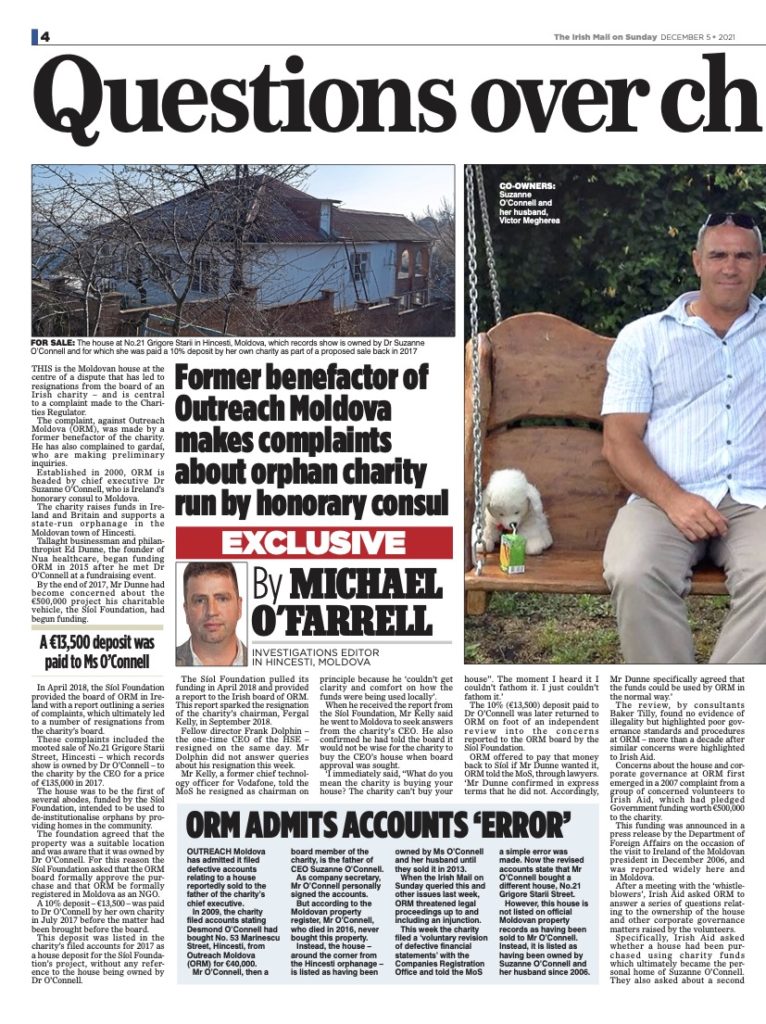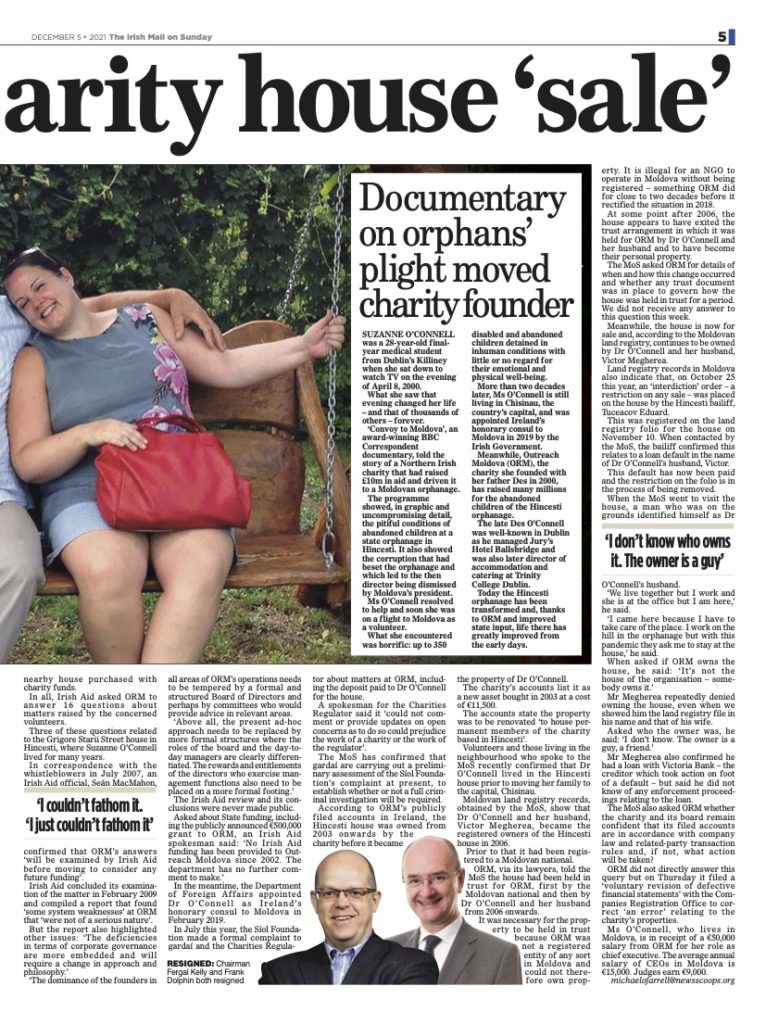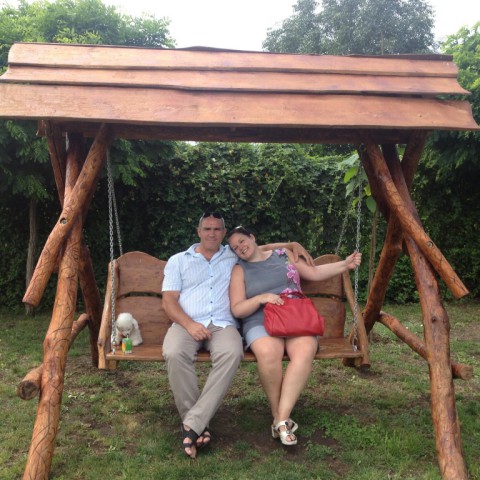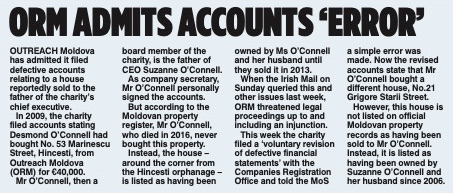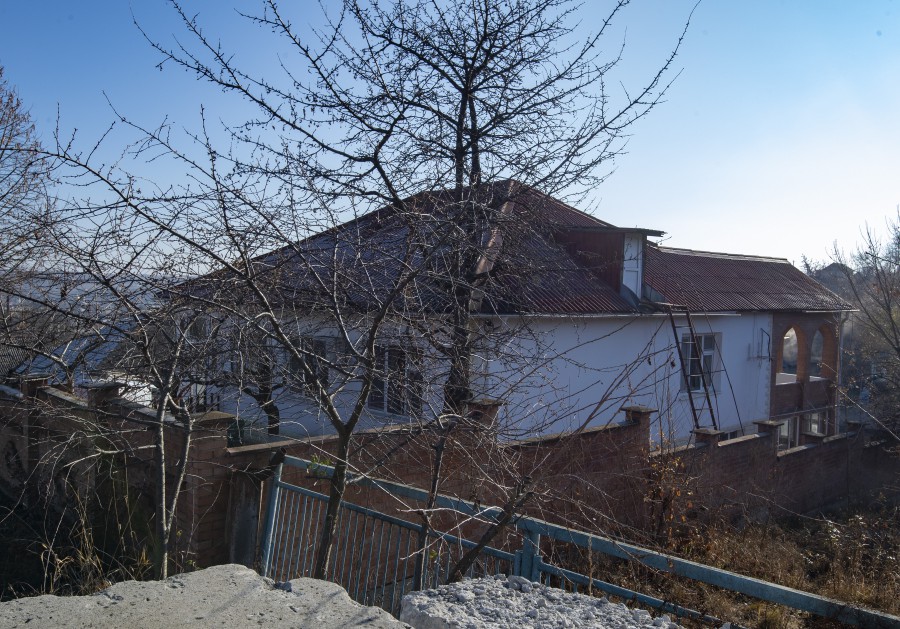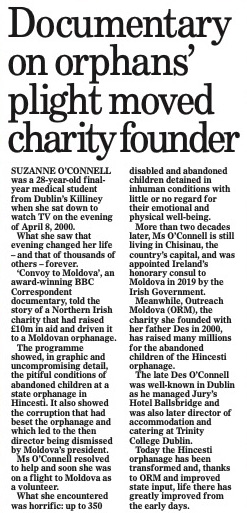THIS is the Moldovan house at the centre of a dispute that has led to resignations from the board of an Irish charity – and is central to a complaint made to the Charities Regulator.
The complaint, against Outreach Moldova (ORM), was made by a former benefactor of the charity. He has also complained to gardaí, who are making preliminary inquiries.
Established in 2000, ORM is headed by chief executive Dr Suzanne O’Connell, who is Ireland’s honorary consul to Moldova.
The charity raises funds in Ireland and Britain and supports a state-run orphanage in the Moldovan town of Hincesti.
Tallaght businessman and philanthropist, Ed Dunne, the founder of Nua healthcare, began funding ORM in 2015 after he met Dr O’Connell at a fundraising event.
By the end of 2017, Mr Dunne had become concerned about the €500,000 project his charitable vehicle, the Síol Foundation, had begun funding.
In April 2018, the Síol Foundation provided the board of ORM in Ireland with a report outlining a series of complaints, which ultimately led to a number of resignations from the charity’s board.
These complaints included the mooted sale of No.21 Grigore Starii Street, Hincesti – which records show is owned by Dr O’Connell – to the charity by the CEO for a price of €135,000 in 2017.
The house was to be the first of several abodes, funded by the Síol Foundation, intended to be used to de-institutionalise orphans by providing homes in the community.
The foundation agreed that the property was a suitable location and was aware that it was owned by Dr O’Connell. For this reason the Síol Foundation asked that the ORM board formally approve the purchase and that ORM be formally registered in Moldova as an NGO.
A 10% deposit – €13,500 – was paid to Dr O’Connell by her own charity in July 2017 before the matter had been brought before the board.
This deposit was listed in the charity’s filed accounts for 2017 as a house deposit for the Síol Foundation’s project, without any reference to the house being owned by Dr O’Connell.
The Síol Foundation pulled its funding in April 2018 and provided a report to the Irish board of ORM. This report sparked the resignation of the charity’s chairman, Fergal Kelly, in September 2018.
Fellow director Frank Dolphin – the one-time CEO of the HSE – resigned on the same day. Mr Dolphin did not answer queries about his resignation this week.
Mr Kelly, a former chief technology officer for Vodafone, told the MoS he resigned as chairman on principle because he ‘couldn’t get clarity and comfort on how the funds were being used locally’.
When he received the report from the Síol Foundation, Mr Kelly said he went to Moldova to seek answers from the charity’s CEO. He also confirmed he had told the board it would not be wise for the charity to buy the CEO’s house when board approval was sought.
‘I immediately said, “What do you mean the charity is buying your house? The charity can’t buy your house”. The moment I heard it I couldn’t fathom it. I just couldn’t fathom it.’
The 10% (€13,500) deposit paid to Dr O’Connell was later returned to ORM on foot of an independent review into the concerns reported to the ORM board by the Síol Foundation.
ORM offered to pay that money back to Síol if Mr Dunne wanted it, ORM told the MoS, through lawyers. ‘Mr Dunne confirmed in express terms that he did not. Accordingly, Mr Dunne specifically agreed that the funds could be used by ORM in the normal way.’
The review, by consultants Baker Tilly, found no evidence of illegality but highlighted poor governance standards and procedures at ORM – more than a decade after similar concerns were highlighted to Irish Aid.
Concerns about the house and corporate governance at ORM first emerged in a 2007 complaint from a group of concerned volunteers to Irish Aid, which had pledged Government funding worth €500,000 to the charity.
This funding was announced in a press release by the Department of Foreign Affairs on the occasion of the visit to Ireland of the Moldovan president in December 2006, and was reported widely here and in Moldova.
After a meeting with the ‘whistleblowers’, Irish Aid asked ORM to answer a series of questions relating to the ownership of the house and other corporate governance matters raised by the volunteers.
Specifically, Irish Aid asked whether a house had been purchased using charity funds which ultimately became the personal home of Suzanne O’Connell. They also asked about a second nearby house purchased with charity funds .
In all, Irish Aid asked ORM to answer 16 questions about matters raised by the concerned volunteers.
Three of these questions related to the Grigore Starii Streethouse in Hincesti, where Suzanne O’Connell lived for many years.
In correspondence with the ‘whistleblowers’, in July 2007, an Irish Aid official, Seán MacMahon, confirmed that ORM’s answers ‘will be examined by Irish Aid before moving to consider any future funding.’
Irish Aid concluded its examination of the matter in February 2009 and compiled a report that found ‘some system weaknesses’ at ORM that ‘were not of a serious nature’.
But the report also highlighted other issues: ‘The deficiencies in terms of corporate governance are more embedded and will require a change in approach and philosophy.’
‘The dominance of the founders in all areas of ORM’s operations needs to be tempered by a formal and structured Board of Directors and perhaps by committees who would provide advice in relevant areas.
‘Above all, the present ad-hoc approach needs to be replaced by more formal structures where the roles of the board and the day-today managers are clearly differentiated. The rewards and entitlements of the directors who exercise management functions also need to be placed on a more formal footing.’
The Irish Aid review and its conclusions were never made public.
Asked about State funding, including the publicly announced €500,000 grant to ORM, an Irish Aid spokesman said: ‘No Irish Aid funding has been provided to Outreach Moldova since 2002. The department has no further comment to make.’
In the meantime, the Department of Foreign Affairs appointed Dr O’Connell as Ireland’s honorary consul to Moldova in February 2019.
In July this year, the Síol Foundation made a formal complaint to gardaí and the Charities Regulator about matters at ORM, including the deposit paid to Dr O’Connell for the house.
A spokesman for the Charities Regulator said it ‘could not comment or provide updates on open concerns as to do so could prejudice the work of a charity or the work of the regulator’.
The MoS has confirmed that gardaí are carrying out a preliminary assessment of the Síol Foundation’s complaint at present, to establish whether or not a full criminal investigation will be required.
According to ORM’s publicly filed accounts in Ireland, the Hincesti house was owned from 2003 onwards by the charity before it became the property of Dr O’Connell.
The charity’s accounts list it as a new asset bought in 2003 at a cost of €11,500.
The accounts state the property was to be renovated ‘to house permanent members of the charity based in Hincesti’.
Volunteers and those living in the neighbourhood who spoke to the MoS recently confirmed that Dr O’Connell lived in the Hincesti house prior to moving her family to the capital, Chisinau.
Moldovan land registry records, obtained by the MoS, show that Dr O’Connell and her husband, Victor Megherea, became the registered owners of the Hincesti house in 2006.
Prior to that it had been registered to a Moldovan national.
ORM, via its lawyers, told the MoS the house had been held in trust for ORM, first by the Moldovan national and then by Dr O’Connell and her husband from 2006 onwards.
It was necessary for the property to be held in trust because ORM was not a registered entity of any sort in Moldova and could not therefore own property.
It is illegal for an NGO to operate in Moldova without being registered – something ORM did for close to two decades before it rectified the situation in 2018.
At some point after 2006, the house appears to have exited the trust arrangement in which it was held for ORM by Dr O’Connell and her husband and to have become their personal property.
The MoS asked ORM for details of when and how this change occurred and whether any trust document was in place to govern how the house was held in trust for a period. We did not receive any answer to this question this week.
Meanwhile, the house is now for sale and, according to the Moldovan land registry, continues to be owned by Dr O’Connell – and her husband, Victor Megherea.
Land registry records in Moldova also indicate that, on October 25 this year, an ‘interdiction’ order – a restriction on any sale – was placed on the house by the Hincesti bailiff, Tuceacov Eduard.
This was registered on the land registry folio for the house on November 10. When contacted by the MoS, the bailiff confirmed this relates to a loan default in the name of Dr O’Connell’s husband, Victor .
This default has now been paid and the restriction on the folio is in the process of being removed.
When the MoS went to visit the house, a man who was on the grounds identified himself as Dr O’Connell’s husband.
‘We live together but I work and she is at the office but I am here,’ he said.
‘I came here because I have to take care of the place. I work on the hill in the orphanage but with this pandemic they ask me to stay at the house,’ he said.
When asked if ORM owns the house, he said: ‘It’s not the house of the organisation – somebody owns it.’
Mr Megherea repeatedly denied owning the house, even when we showed him the land registry file in his name and that of his wife.
Asked who the owner was, he said: ‘I don’t know. The owner is a guy, a friend.’
Mr Megherea also confirmed he had a loan with Victoria Bank – the creditor which took action on foot of a default – but said he did not know of any enforcement proceedings relating to the loan.
The MoS also asked ORM whether the charity and its board remain confident that its filed accounts are in accordance with company law and related-party transaction rules and, if not, what action will be taken?
ORM did not directly answer this query but on Thursday it filed a ‘voluntary revision of defective financial statements’ with the Companies Registration Office to correct ‘an error’ relating to the charity’s properties.
Ms O’Connell, who lives in Moldova, is in receipt of a €50,000 salary from ORM for her role as chief executive. The average annual salary of CEOs in Moldova is €15,000. Judges earn €9,000.

